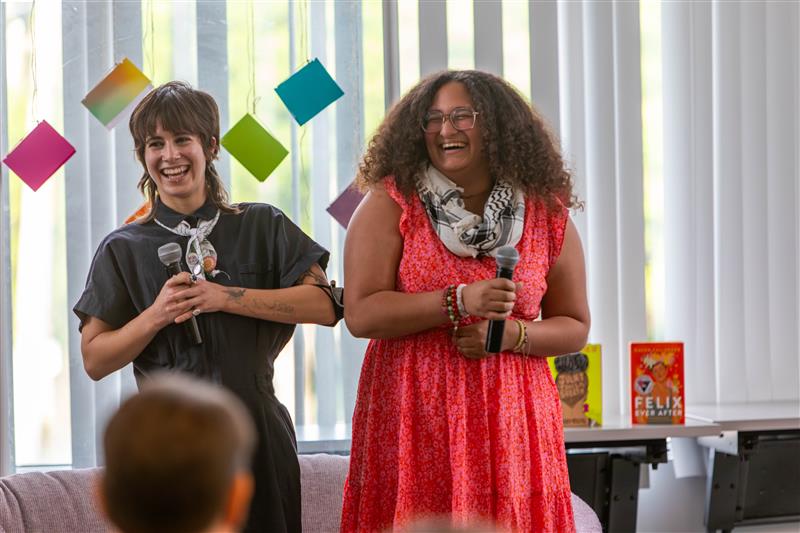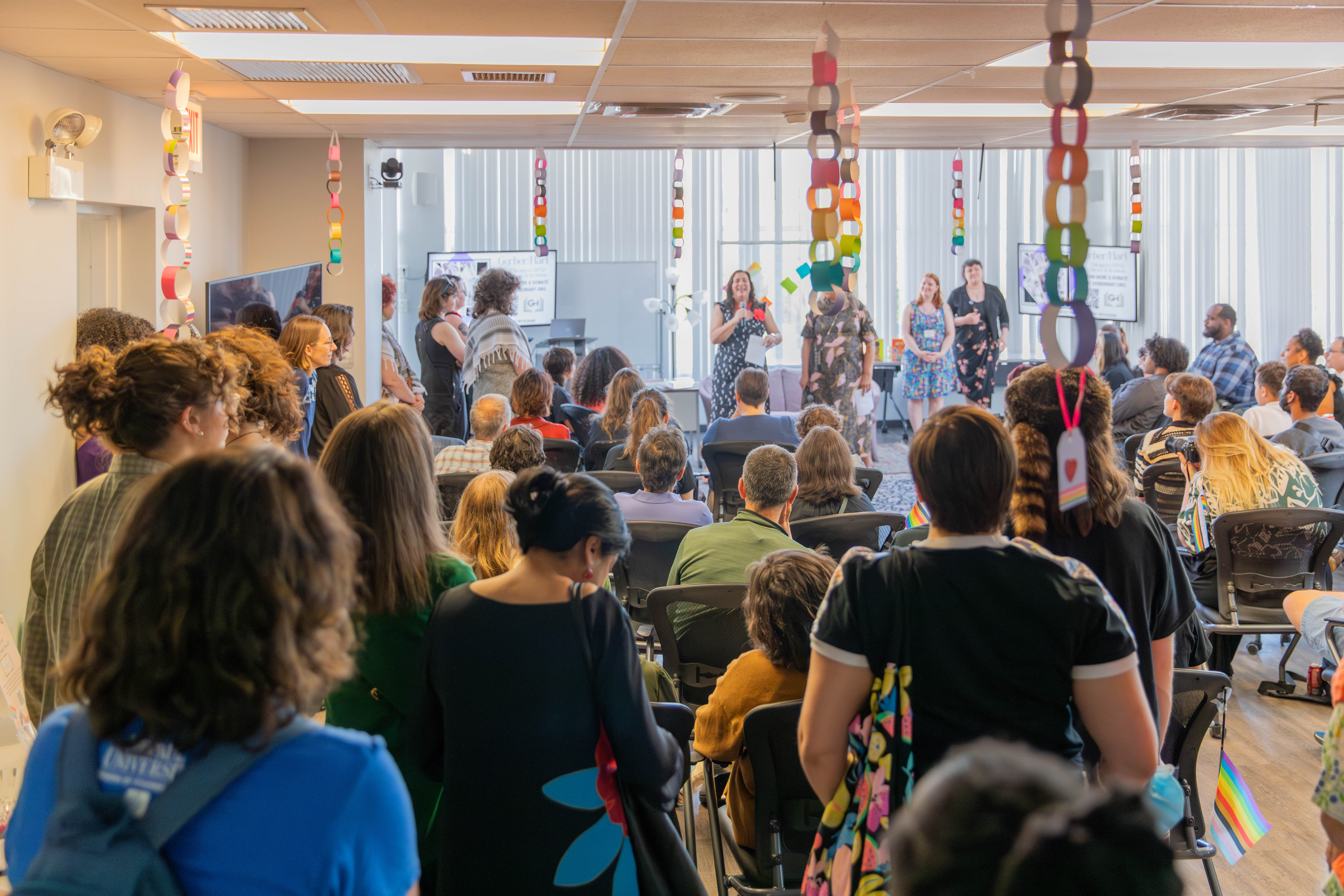
2023-24 Student fellows Bella Netti and Taylor Sellers-Varela speaking at the Do Say Gay event at Gerber/Hart Library and Archives (Photo by Keeton Holder/DePaul University).

Community members sit in an audience listening to speakers at the Do Say Gay event at the Gerber/Hart Library and Archives (Photo by Keeton Holder/DePaul University).
In humanities classes, students have the opportunity to explore various perspectives on these topics and discuss their values. How do students translate this learning into action outside the classroom and engage with the community and issues they care about most? Taylor Sellers-Varela, a former student fellow of the Experiential Humanities Collaborative, cites applying to the program as “the best decision I’ve made in college so far.”
"The humanities are central to issues of social justice — through the study of history, literature, language, philosophy and art, we not only reveal what is unjust, but champion all that is vibrant, resilient, and enduring in our communities,” says
Margaret Storey, history professor and associate dean of the College of Liberal Arts and Social Sciences.
Since 2020, DePaul’s
Experiential Humanities Collaborative, also called HumanitiesX, has helped students understand how humanities learning can inform real-world action and change. The Collaborative brings faculty, student fellows and community partners together to design new, community-engaged, project-based humanities courses in an annual fellowship cohort. Now, a $750,000 grant from the
Mellon Foundation will extend and expand the program for an additional three years.
“The College of Liberal Arts and Sciences is thrilled and honored to receive continued support from the Mellon Foundation for our innovative HumanitiesX program,” Storey says. “HumanitiesX allows our students and faculty to collaborate with community leaders to understand the world more deeply, to question why things are the way they are and to take action to make meaningful change for the better.”
Each HumanitiesX course blends traditional humanities approaches with community-engaged experiential learning, culminating in a public-facing project. The original program model consisted of three teams – consisting of faculty members, student fellows and a community partner – that each created a class central to one of program’s three key themes: Immigration and Migration, The Environment: Crisis and Action or Democracy and Rights.
For example, one of last year’s courses worked with
Alliance Française de Chicago.
“The students did a quarter-long close reading of Tocqueville's 'Democracy in America,'” says Lisa Dush, professor of writing, rhetoric and discourse and faculty director of HumanitiesX. “They also attended a civic meeting and volunteered in the community, using these experiences to better understand Tocqueville’s ideas. As their final project, the students organized a public conversation at the Alliance, engaging over 100 Chicagoans in a timely conversation about democracy today.”
For the next three years, the program’s capacity will increase to five teams, supporting collaboration with additional community partners and increasing experiential learning opportunities for students. Funding from the Mellon Foundation recognizes partners' contributions with a $10,000 pass-through grant to their organization, as well as compensation for faculty and student fellows for their participation and expertise.
“When I first heard about HumanitiesX, the hook of reimagining humanities education led to me applying because I want to go into education after graduation,” says Sellers-Varela, a junior double majoring in English and Cinema and Media studies. “I gained a lot of great, real-world experiences, met a lot of like-minded people who are interested in similar things and got to use the humanities to enact positive change.”
Sellers-Varela assisted two professors in a 2024 HumanitiesX course called Do Say Gay: Banned Books and LGBTQ+ Freedom. Students in this course collaborated with the
Gerber/Hart Library and Archives to learn about LGBTQ+ history and design a public exhibit of the archives’ materials.
In addition to assisting faculty and their community partners, Student Fellows write
public-facing articles about the experiential humanities, HumantiesX courses, and the themes these courses engage. They also helped create a
series of guides for others interested in developing publicly engaged and experiential humanities projects.
Sellers-Varela's
article about the South Side Community Art Center highlights the importance of spaces that immerse visitors in art and culture.
“As a student fellow, I thought a lot about the application of the humanities in every aspect of life," they say. "It was cool to get hands-on experience in what goes into creating a college course and applying that to uplifting and celebrating people who are impacted by the systems around us. It's been very valuable and I would wholeheartedly recommend it."
Faculty applications for the 2025 fellowship cohort are now open until December 5, 2024. Interested students are encouraged to apply to be HumanitiesX student fellows when applications open in the winter quarter.
For more information about the HumanitiesX program, subscribe to the
newsletter.
Jade Walker is a student assistant of media relations and communications in University Communications.